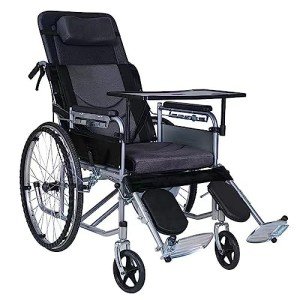Bariatric Folding Wheelchair
Bariatric folding wheelchairs are designed to accommodate users of a larger size. They include a greater weight capacity than basic designs and are built with reinforced materials for included stability and longevity.

Nevertheless, not everyone with a high body mass index (BMI) needs a bariatric chair as many fall within the safe weight limits of standard wheelchairs.
Size and Weight Capacity
Bariatric wheelchairs have broader seats and are designed to accommodate larger people, generally weighing as much as 500 pounds. These chairs have a durable frame made from reinforced products like steel and are constructed with larger wheels that supply more weight circulation and maneuverability for bigger users.
When comparing bariatric wheelchairs, make certain the weight capacity is listed as fixed or active load. Fixed weight capacity refers to how much a chair can hold when it's sitting still, while active load capacity is identified by putting the chair through a drop test that mimics someone plopping down into the seat.
Basic wheelchairs are extensively produced and designed for users with average body weights, making them more budget-friendly than bariatric designs. Medicare and other insurance coverages may only cover a restricted number of bariatric wheelchairs, depending upon a client's medical requirements and medical diagnosis. These chairs are also more costly than basic wheelchairs because they have a customized style and construction. Nevertheless, they are an excellent service for patients with a vast array of medical conditions that need a more comfy travel experience.
Seat Dimensions and Comfort
Unlike standard wheelchairs, bariatric designs have larger seats to accommodate larger individuals. They also have more robust frames and large, resilient wheels that can withstand greater loads. They can be tailored with numerous seating options and accessories based on the user's needs and preferences.
When comparing wheelchairs, it's important to look at their weight capabilities under both static and active load rankings. Static load refers to the chair's optimum capacity when it's sitting still, while active load steps just how much a wheelchair can safely hold when somebody beings in it and moves. Some manufacturers might also show the weight limit of a bariatric wheelchair in kgs, which is often more accurate because it takes into consideration the average bodyweight of an individual who utilizes the chair.
In addition to a broad seat, a bariatric folding wheelchair should have adjustable cushioned leg rests to help users remain comfy while taking a trip. It needs to likewise have turn up armrests that can be moved out of the way to avoid getting in the user's method when they want to stand up or transfer to another surface.
If you're considering a bariatric wheelchair, ask a doctor or mobility professional for recommendations. They can examine your requirements, recommend the right chairs for you, and guide you through the procedure of buying one. They can also help you compare functions and prices to discover a wheelchair that finest fits your budget plan. They can even provide advice on other mobility options such as power positioning systems and iLevel seating.
Weight and Portability
While standard wheelchairs are typically affordable, bariatric chairs tend to be a bit more expensive. This is due to their specialized design and construction, as well as the reality that they're a little heavier than their counterparts.
If you're concerned about the cost of a bariatric chair, speak to a healthcare supplier or mobility specialist. They'll be able to assess your distinct requirements and identify which type of wheelchair is the finest fit for you. They can likewise recommend wheelchair devices based on your particular requirements. Furthermore, if you're looking to get your wheelchair covered by insurance coverage, such as Medi-Cal, they can guide you on the actions associated with this procedure. To learn more, read our guide to wheelchair insurance protection. Then, you can start your journey towards independent mobility.
Manoeuvrability and Handling
Selecting the right wheelchair can be an important decision for those with minimal mobility. Bariatric wheelchairs use increased weight capacities and are created to accommodate bigger people. They usually feature bigger wheels, broader armrests and seating options, and are sturdier than basic wheelchairs.
When selecting a bariatric wheelchair, consider the person's specific needs and the environment in which they will be utilizing it. Evaluate the weight capacity and seat dimensions, and search for adjustable functions like padded raising leg rests to support comfort and ease of transfer.
Figure out whether the wheelchair is ideal for manual or powered use. For added flexibility, a bariatric folding wheelchair can be easily folded and compressed for storage or transport. This makes them an ideal option for those with limited home space or who require to travel cross countries. The wheelchairs also feature puncture proof wheels to ensure sturdiness and low upkeep. bariatric wheelchair weight for users up to an optimum of 35 stone.
